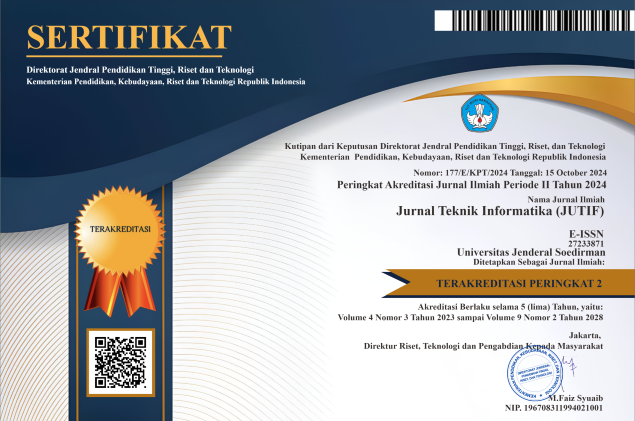DEVELOPMENT OF MOBILE-BASED FREELANCE SERVICES MARKETPLACE WITH FEATURE-DRIVEN DEVELOPMENT METHODOLOGY
DOI:
https://doi.org/10.52436/1.jutif.2024.5.5.2569Keywords:
feature-driven development, freelance, mobile, security, systemAbstract
The rapid advancement of technology demands that humans adapt to the evolving workplace. One of the impacts of technological development is the emergence of freelancers who use online platforms. Online platforms make it easier for freelancers and clients to collaborate. Currently, there are various Freelance Services Marketplace platforms available. However, it is important to note that the developers of these platforms are from outside Indonesia, which poses a risk to the security of people's data and the ease of payment applicable in Indonesia. With the high number of mobile device users in Indonesia,, the development of a mobile-based Freelance Services Marketplace application system that is tailored to local needs and takes into account the data security of Indonesian people, as well as involving local developers, is needed. This research aims to overcome these problems by designing a mobile-based freelance services marketplace application system using the Feature-Driven Development (FDD) method. The selection of FDD as an application development methodology is based on complex feature requirements, good planning management, emphasis on feature quality, and structured. The development process follows the FDD approach starting from feature planning and design, scheduling, implementation, and testing. The application design in this research is based on user needs with a focus on the features needed. This solution is important because it can be used by clients to find freelancers who match their needs and provide opportunities for freelancers to offer their services properly with guaranteed data security and transactions. The main result of this research is that the FDD method can help in the development of a freelance service marketplace application by paying attention to the systematic or structured level, quality, and security of the application.
Downloads
References
N. U. Haq, A. A. Raja, S. Nosheen, and M. F. Sajjad, “Determinants of client satisfaction in web development projects from freelance marketplaces,” International Journal of Managing Projects in Business, vol. 11, no. 3, pp. 583–607, 2018, doi: 10.1108/IJMPB-02-2017-0017.
F. Stephany, O. Kässi, U. Rani, and V. Lehdonvirta, “Online Labour Index 2020: New ways to measure the world’s remote freelancing market,” Big Data Soc, vol. 8, no. 2, 2021, doi: 10.1177/20539517211043240.
A. Sunardi and Suharjito, “MVC architecture: A comparative study between laravel framework and slim framework in freelancer project monitoring system web based,” Procedia Comput Sci, vol. 157, pp. 134–141, 2019, doi: 10.1016/j.procs.2019.08.150.
J. Brunzel, “An empirical analysis of linguistic styles in new work services: The case of Fiverr.com,” European Management Review, 2023, doi: 10.1111/emre.12562.
A. Blaising and L. Dabbish, “Managing the Transition to Online Freelance Platforms: Self-Directed Socialization,” Proc ACM Hum Comput Interact, vol. 6, Nov. 2022, doi: 10.1145/3555201.
A. Hannák, A. Mislove, C. Wagner, M. Strohmaier, D. Garcia, and C. Wilson, “Bias in Online freelance marketplaces: Evidence from TaskRabbit and Fiverr,” in Proceedings of the ACM Conference on Computer Supported Cooperative Work, CSCW, Association for Computing Machinery, Feb. 2017, pp. 1914–1933. doi: 10.1145/2998181.2998327.
L. Jia and L. Ruan, “Going global: Comparing chinese mobile applications’ data and user privacy governance at home and abroad,” Internet Policy Review, vol. 9, no. 3, pp. 1–22, 2020, doi: 10.14763/2020.3.1502.
A. Hidayati, E. K. Budiardjo, and B. Purwandari, “Software Engineer Competencies in Global Software Development: An Indonesian Perspective,” Tehnicki Vjesnik, vol. 29, no. 2, pp. 683–691, Apr. 2022, doi: 10.17559/TV-20210103153044.
M. I. Hanip and N. A. Hamid, “MyFREELANCER App,” Applied Information Technology And Computer Science, vol. 3, no. 2, pp. 1130–1143, 2022, doi: 10.30880/aitcs.2022.03.02.068.
F. Anwer et al., “Comparative Analysis of FDD and SFDD Zahid Nawaz Xint Solutions Comparative Analysis of FDD and SFDD,” 2018. [Online]. Available: https://www.researchgate.net/publication/323560594
S. Al-Saqqa, S. Sawalha, and H. Abdelnabi, “Agile software development: Methodologies and trends,” International Journal of Interactive Mobile Technologies, vol. 14, no. 11, pp. 246–270, 2020, doi: 10.3991/ijim.v14i11.13269.
S. S., S. Ali, and A. Babu, “A Hybrid Agile model using SCRUM and Feature Driven Development,” Int J Comput Appl, vol. 156, no. 5, pp. 1–5, Dec. 2016, doi: 10.5120/ijca2016912443.
M. Javanmard and M. Alian, “Comparison between Agile and Traditional software development methodologies,” Cumhuriyet University Faculty of Science Science Journal (CSJ), vol. 36, no. 3, p. 36, 2015, [Online]. Available: http://dergi.cumhuriyet.edu.tr/cumuscij©2015
S. Aftab et al., “Using FDD for small project: An empirical case study,” International Journal of Advanced Computer Science and Applications, vol. 10, no. 3, pp. 151–158, 2019, doi: 10.14569/IJACSA.2019.0100319.
Shama PS and Shivamanth A, “A Review of Agile Software Development Methodologies,” International Journal of Advanced Studies in Computers, Science and Engineering, vol. 4, 2015. [Online]. Available: www.ijascse.org
S. Goyal, “Major Seminar On Feature Driven Development Agile Techniques for Project Management and Software Engineering,” Jennifer Schiller Chair of Applied Software Engineering. Aug 2008, pp. 90-91.
S. G. Tetteh, “Empirical Study of Agile Software Development Methodologies: A Comparative Analysis,” Asian Journal of Research in Computer Science, vol. 17, no. 5, pp. 30–42, Feb. 2024, doi: 10.9734/ajrcos/2024/v17i5436.
B. Suri, S. Taneja, I. Bhanot, H. Sharma, and A. Raj, “Cross-Platform Empirical Analysis of Mobile Application Development frameworks: Kotlin, React Native and Flutter,” in ACM International Conference Proceeding Series, Association for Computing Machinery, Dec. 2022. doi: 10.1145/3590837.3590897.
R. Coppola, L. Ardito, and M. Torchiano, “Characterizing the transition to kotlin of android apps: A study on F-Droid, Play Store, and GitHub,” WAMA 2019 - Proceedings of the 3rd ACM SIGSOFT International Workshop on App Market Analytics, co-located with ESEC/FSE 2019, pp. 8–14, 2019, doi: 10.1145/3340496.3342759.
A. Ribeiro, J. F. Ferreira, and A. Mendes, “EcoAndroid: An Android Studio Plugin for Developing Energy-Efficient Java Mobile Applications.” in 2021 IEEE 21st International Conference on Software Quality, Reliability and Security (QRS), pp. 62-69, IEEE, 2021.



























